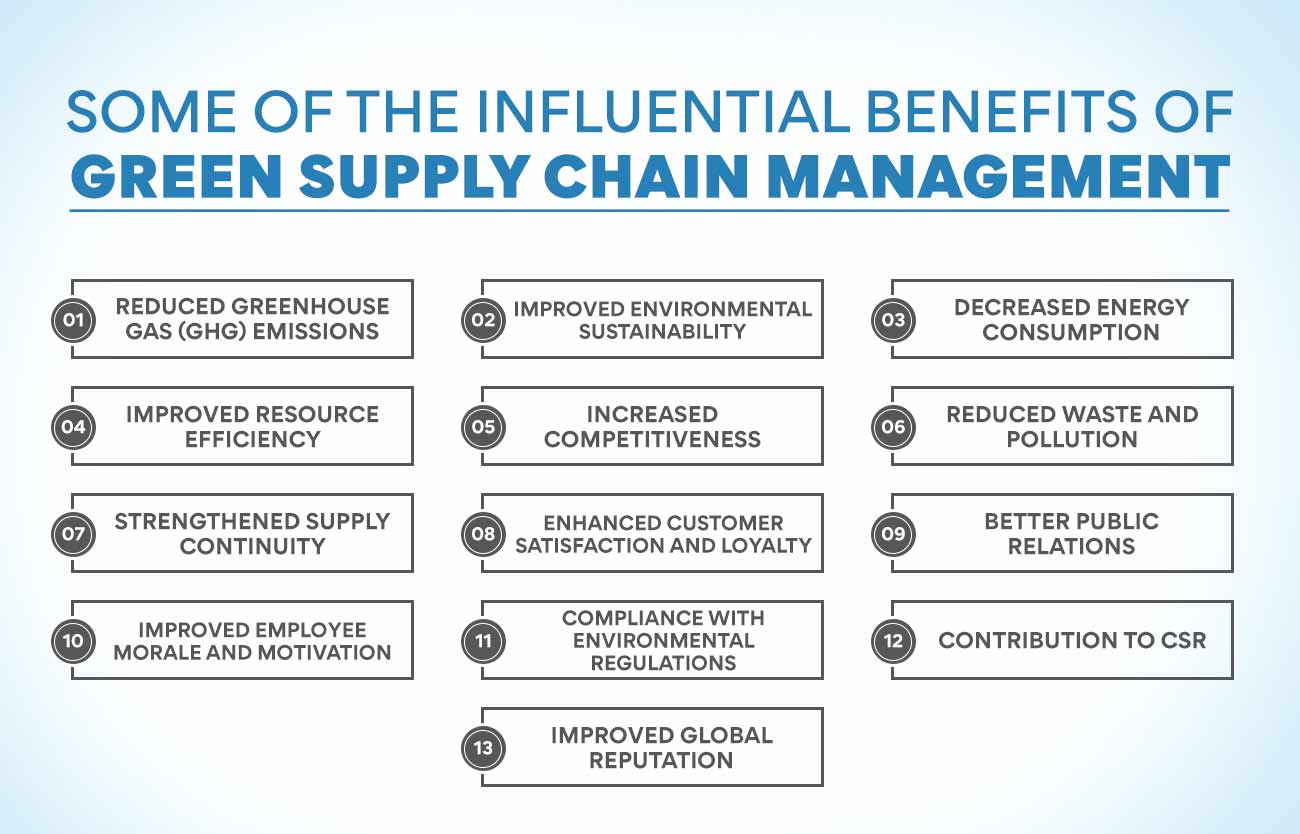Green supply chain management is a critical piece of the puzzle regarding sustainability and reducing our carbon footprint. In layman’s terms, it is the process of managing the environmental impact of the supply chain. It can include anything from reducing energy consumption to recycling and composting.
Why does green supply chain management matter? A growing number of consumers show interest in buying products with minimal environmental impact. If businesses want to stay competitive in today’s market, they need to start implementing green supply chain management practices into their business. Let’s understand green supply chain management (Green SCM) in detail to see how it can benefit businesses and the environment.
What Is Green Supply Chain Management?
Green Supply Chain Management is a set of green management practices to help organisations operate more sustainably and efficiently. It’s also sometimes called sustainable supply chain management or green logistics.
It evaluates the sustainability and environmental impact of every product and process along the supply chain, from sourcing raw materials to manufacturing, distributing and delivery. Green SCM looks for ways to minimise waste and pollution, conserve resources, and reduce the carbon footprint of products and services.
Green SCM is not just about being green for the sake of being green. It’s also about improving sustainability and making operations more efficient. It is a holistic green method taking into account the triple bottom line of sustainability: people, planet, and profits.
With green SCM, companies can also contribute to their corporate social responsibility (CSR). It helps companies meet their environmental goals and improve their public image. Many green SCM initiatives also have the added benefit of reducing costs. For example, green transportation initiatives can reduce fuel consumption and save money, and green packaging initiatives can reduce materials and waste disposal costs.
The National Association of Manufacturers, green SCM is becoming more critical to companies. The survey found that nearly half of respondents said they have a green SCM program in place, and another third said they are considering implementing one.
In a nutshell, green supply chain management is about minimising waste and pollution, conserving resources, and reducing the carbon footprint of products and services. A growing number of businesses recognise the importance of green SCM and are implementing programs to improve their sustainability.
If green supply chain management is something that interests you, we encourage you to check out our course, Advanced Certificate in Operations, Supply Chain and Project Management. This interactive and engaging course will give you the strong foundation on supply chain management that you need to get started.
What Are The Possible Benefits Green SCM Bring To The Table?
Green SCM comes with an abundance of benefits that both the company and society will enjoy. Some of the influential benefits that green SCM bring to the table are:
Reduced Greenhouse Gas (GHG) Emissions
Greenhouse gases like carbon dioxide (CO₂) and methane (CH₄) are released when fossil fuels are burned. Green SCM can help reduce these gases’ emissions by promoting the use of green energy sources, green transportation methods, and energy-efficient manufacturing processes. Regularly adopting green SCM practices makes it possible to achieve a significant reduction in GHG emissions over time, which will help mitigate climate change.
Improved Environmental Sustainability
Green SCM practices can help to improve the environmental sustainability of a company’s operations. It is because green SCM practices often lead to reduced resource consumption, waste generation, and improved energy efficiency. In turn, these benefits can help to reduce a company’s environmental impact and improve its overall sustainability performance.
Decreased Energy Consumption
It is evident that green SCM practices would lead to decreased energy consumption. It is due to the fact that green practices often revolve around being more efficient with resources. In other words, green practices aim to do more with less energy consumption. Therefore, it only stands to reason that green supply chain management would decrease overall energy consumption.
Improved Resource Efficiency
It goes without saying that greening your supply chain will make it more resource-efficient. After all, one of the main goals of green operations is to minimise waste and optimise processes. By working with green supply chain partners, you can be sure they are also committed to resource efficiency and waste reduction. There is also the potential to share best practices and learn from each other to further green operations.
Increased Competitiveness
In today’s business environment, being green is no longer just an option – it’s a necessity. A green supply chain can give the company a competitive edge by helping to improve its bottom line and increase its customer base. The business that is seen as green and sustainable are the ones that will thrive in the future. Hence, staying ahead of the curve and adopting green practices in the supply chain that will future-proof the business is essential.
Reduced Waste and Pollution
Every business should look for ways to cut waste and pollution, and green supply chain management can help. Working with green suppliers can reduce the amount of waste produced throughout the supply chain. It is not only beneficial for the environment but can also save the business money. Reduced wastage in production and packaging can lead to increased profits, so it’s a win-win for everyone involved. Hence, green supply chain management is good for the environment and makes good business sense.
Strengthened Supply Continuity
Many green initiatives improve supply chain efficiency and reduce waste, resulting in increased reliability and cost savings. For example, a company might choose to source locally produced materials to reduce transportation costs and emissions. It will increase the continuation of the supply chain without making any big changes.
Enhanced Customer Satisfaction and Loyalty
In many cases, green initiatives can lead to increased customer satisfaction. For example, a product manufactured using sustainable practices can be seen as more trustworthy and of higher quality. It can lead to increased customer loyalty and repeat business. Customers will be inclined towards companies that they perceive as being environmentally responsible.
Better Public Relations
Going green can also improve a company’s public image and reputation. It is especially true if the company is in a highly-polluting industry. Implementing green initiatives can show the public that the company is committed to reducing its environmental impact. As a result, companies may find it easier to attract and retain customers. It is evident that green SCM can positively impact various aspects of a company’s operations. As the world increasingly focuses on sustainability, businesses need to understand and implement green practices in their supply chain.
Improved Employee Morale and Motivation
Not just customer satisfaction but green SCM is also linked with employees’ morale. Increased motivation has a direct link to employee productivity. And green SCM policies can increase employee motivation by providing opportunities for employees to work on green initiatives and be recognised for their efforts. They will be able to see the tangible results of their work and feel good about contributing to a more sustainable future. Such revelations will also inspire green behaviour outside of work, which can have a positive ripple effect on the environment.
Compliance With Environmental Regulations
Many countries have environmental regulations in place that businesses must comply with. It can be a challenge for companies, primarily if they are operating in multiple countries with different regulations. Green SCM can help companies meet these requirements while reducing their environmental impact. With green SCM, businesses can make sure they use environmentally-friendly practices throughout their supply chains.
Contribution to CSR
Green SCM is not only good for the environment but also for a company’s reputation. It can contribute to a company’s CSR (Corporate Social Responsibility) initiatives. A green supply chain can help a company to be perceived as environmentally responsible and committed to sustainable practices. It will positively impact the company’s brand and reputation.
Improved Global Reputation
In today’s business world, consumers and other stakeholders are increasingly interested in working with companies that are strongly committed to environmental sustainability. As such, green supply chain management can help to improve a company’s reputation in the eyes of these important groups. When a company green-ifies its supply chain, it often sees an improved reputation from consumers and other businesses. It is because green practices are becoming increasingly important to the general public, and companies that don’t adopt them are seen as being behind the times. In addition, green SCM can help a company form closer relationships with its suppliers as they work together towards a common goal.
Green SCM For Supply Chain Managers
If you aspire to become a professional supply chain manager, you must understand the concept of green supply chain management and how you can implement it into your business. It is essential to talk about green SCM with your team and clients. As a supply chain manager, there are a few terminologies you must keep a few things in mind regarding green SCM:

- Green Supply Chain Management: The greening of supply chain processes to reduce negative environmental impacts
- Greenwashing: The act of making false or misleading claims about the environmental benefits of a product or service
- Sustainable supply chain management: A holistic approach to SCM that takes into account social, economic, and environmental concerns.
- Life Cycle Assessment: A tool to evaluate the environmental impacts of a product or service over its entire life cycle
- Carbon footprint: A measurement of carbon dioxide (CO₂) and other greenhouse gases emitted by an individual, organisation, event, or product.
Do you want to learn the basics of green supply chain management? Check out our course, Advanced Certificate in Operations, Supply Chain and Project Management which will make you acquainted with the nitty-gritty of supply chain management through a flexible and interactive course plan.
Green SCM Practices
There are a number of green SCM practices that companies can adopt. Some standard practices include:
- Improving energy efficiency
- Recycling materials
- Using green transportation options
- Using recycled or recyclable packaging materials
- Working with green suppliers
- Reducing waste throughout the supply chain
- Implementing green manufacturing processes
- Using green energy sources
Each company will have different green SCM goals, depending on their particular circumstances. However, all companies can benefit from reduced costs, improved efficiency, and a smaller environmental footprint. It has the potential to improve not only a company’s bottom line but also its relationships with suppliers, consumers, and other stakeholders. Implementing green supply chain management practices can be a challenge, but the rewards are definitely worth it.
Companies With A Strong Green Supply Chain Management
There are plenty of global companies that have already adopted green practices in their supply chain management.
Nike, for one, has been using green supply chain management since the early 1990s. The company has a green. The supply chain management team is responsible for ensuring that its suppliers meet Nike’s standards for green manufacturing.
Nike also offers green supply chain management training to its suppliers so that they can learn how to reduce their environmental impact.
Other companies that have adopted green supply chain management include IBM, HP, and Dell.
These companies have all implemented green practices into their supply chains in order to reduce their environmental impact and improve their sustainability.
The Bottom Line
Green supply chain management is not only good for the environment, but it is also good for business. Companies that adopt green practices into their supply chains often see a decrease in costs, as well as an increase in efficiency. If more companies adopted green practices into their supply chains, we would see a decrease in pollution and a reduction in the amount of resources used.
Green supply chain management is a growing field, and those who are able to talk about it and implement green practices into their business will be ahead of the curve. If you want to learn more about green supply chain management, check out our Advanced Certificate in Operations, Supply Chain and Project Management. This course will make you familiar with everything you need to know about green SCM, from the basics of environmental sustainability to more complex green supply chain management strategies.




























